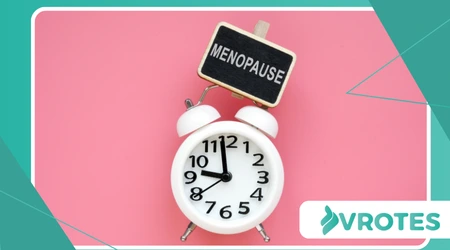How to Identify and Challenge Menopause-Related Negative Thoughts

menopause-related negative thoughts. Menopause is far more than just hot flashes and night sweats; it profoundly affects mental well-being.
Anúncios
The fluctuating levels of estrogen and progesterone can disrupt neurotransmitter activity, particularly serotonin, which plays a crucial role in mood regulation.
This hormonal dance often initiates a cascade of challenging thoughts.
Women frequently report feelings of anxiety, irritability, sadness, and even a diminished sense of self-worth.
These aren’t character flaws; they’re often direct physiological responses. Acknowledging this connection is vital for self-compassion and effective management.
Anúncios
Consider the brain during menopause as a finely tuned instrument whose strings are suddenly being retuned.
The familiar melodies may sound off-key, leading to confusion and distress. It takes time and deliberate effort to adjust to the new harmony.
Identifying the Whisperers of Doubt: Recognizing Negative Thought Patterns
Spotting menopause-related negative thoughts is crucial for effectively challenging them.
These thoughts often manifest as distorted perceptions of reality, amplifying worries and diminishing strengths. They can be subtle at first, then gradually become more persistent.
One common pattern is catastrophic thinking, where minor issues are blown entirely out of proportion. For instance, a forgotten appointment might transform into “I’m losing my mind, I can’t manage anything anymore.” This can be incredibly debilitating.
Another pervasive negative thought pattern is self-criticism, often centered around physical changes or perceived loss of vitality.
Women might internalize societal pressures about aging, leading to thoughts like, “I’m no longer attractive or capable.” Such thoughts erode self-esteem.
Rumination, repeatedly dwelling on negative thoughts or feelings, also thrives during menopause.
Read more: Tips to Reduce Stress Without Adding Time to Your Day
A minor disagreement with a spouse could replay endlessly, each iteration fueling feelings of resentment or inadequacy. Breaking this cycle is essential.
Challenging the Narratives: Strategies for Cognitive Restructuring
Once identified, menopause-related negative thoughts can be challenged and reframed. Cognitive Behavioral Therapy (CBT) techniques offer powerful tools for this process.
The core idea is that our thoughts, not just external events, determine our emotional responses.
One effective strategy is thought-stopping. When a negative thought arises, consciously say “stop” to yourself, either aloud or internally. T
his simple interruption can break the thought cycle. Then, intentionally shift your focus to something positive or neutral.
Another technique is cognitive reframing, which involves actively seeking alternative, more balanced perspectives.
If you think, “I’m too old to learn new things,” reframe it as, “My experience offers a unique perspective, and learning is a lifelong journey.” This subtle shift can be empowering.
Evidence-based thinking is also powerful. Ask yourself: “What evidence supports this thought? What evidence contradicts it?”
Often, upon examination, negative thoughts lack concrete support and crumble under scrutiny. This empowers you to rationally assess the situation.

| Negative Thought Example | Cognitive Reframing Example |
| “I’m constantly tired and useless.” | “My body is adapting to significant changes, and I need more rest. I’m prioritizing my well-being.” |
| “My memory is failing; I’m becoming forgetful.” | “Memory lapses are common during hormonal shifts. I’ll implement strategies like lists and reminders.” |
| “I’m no longer attractive.” | “My beauty is evolving. I appreciate the wisdom and strength gained with age.” |
The Power of Self-Compassion and Mindful Awareness
Cultivating self-compassion is paramount when navigating menopause-related negative thoughts.
Treat yourself with the same kindness and understanding you would offer a dear friend facing similar challenges. Remember, this is a normal, albeit often difficult, phase of life.
Mindfulness practices can significantly reduce the impact of negative thoughts. By observing thoughts without judgment, you create a space between yourself and the thought.
This detachment allows you to choose your response rather than being swept away by emotional reactivity.
Read here: Guided Meditation Scripts for Hormonal Turmoil
Consider a cloudy sky: the clouds represent negative thoughts. You wouldn’t try to push them away or get angry at them.
Instead, you observe them, knowing they will eventually pass. Similarly, acknowledge your thoughts, but don’t let them define your inner landscape.
Regular meditation, even for a few minutes daily, can train your mind to be more present and less reactive.
Focus on your breath, the sensations in your body, or sounds around you. This anchors you in the present moment, away from rumination.
Lifestyle as a Foundation for Mental Resilience
Supporting your body through healthy lifestyle choices can significantly bolster your mental resilience against menopause-related negative thoughts.
What you consume, how much you move, and the quality of your sleep all impact your brain chemistry and emotional stability.
A balanced diet rich in whole foods, lean proteins, and healthy fats provides the necessary nutrients for brain function.
Limiting processed foods, sugar, and excessive caffeine can stabilize energy levels and reduce mood swings. Hydration is also frequently overlooked.
Regular physical activity, even moderate exercise, releases endorphins, which have mood-boosting effects.
It also reduces stress hormones and improves sleep quality. Find an activity you enjoy, whether it’s walking, yoga, or dancing, and make it a consistent part of your routine.
++ Crystal Therapy for Emotional Well-Being in Menopause
Prioritizing sleep is non-negotiable. Chronic sleep deprivation exacerbates anxiety, irritability, and cognitive difficulties.
Create a relaxing bedtime routine, ensure your sleep environment is conducive to rest, and aim for 7-9 hours of quality sleep per night.
Seeking Support: When Professional Guidance is Needed
While self-help strategies are powerful, sometimes professional support is necessary, especially if menopause-related negative thoughts become overwhelming or debilitating.
A mental health professional can offer personalized strategies and support.
Therapists specializing in CBT or Acceptance and Commitment Therapy (ACT) can provide structured techniques to manage challenging thoughts and emotions.
They can help you develop coping mechanisms tailored to your specific experiences. Don’t hesitate to seek out a psychologist.
Your doctor can also assess if hormone therapy or other medications might be beneficial in managing severe symptoms.
Discuss all your concerns openly and honestly with your healthcare provider. They are there to support you through this transition.
Research indicates that cognitive behavioral therapy (CBT) is highly effective in reducing the frequency and intensity of negative thoughts and improving quality of life during menopause.
A 2023 study published in the Journal of Women’s Health found that women who participated in a CBT program reported significantly lower levels of anxiety and depression compared to a control group.
This highlights the tangible benefits of structured therapeutic intervention.

Embracing a New Chapter with Clarity and Strength
Menopause is a transformative period, not an ending. It presents an opportunity for growth, self-discovery, and redefining what it means to be a woman.
By actively challenging menopause-related negative thoughts, you empower yourself to navigate this journey with greater clarity and resilience.
Remember, you are not alone in this experience. Many women face similar challenges and emerge stronger.
This phase can be a powerful catalyst for positive change and a deeper connection with your inner wisdom.
Frequently Asked Questions
Are negative thoughts during menopause normal?
Yes, absolutely. Hormonal fluctuations significantly impact brain chemistry, often leading to increased negative thinking, anxiety, and mood swings.
It’s a common and normal response to the physiological changes occurring in your body.
How long do menopause-related negative thoughts last?
The duration varies greatly among individuals. For some, these thoughts may be more pronounced during perimenopause and early menopause, gradually diminishing as hormones stabilize.
For others, they might persist longer. Lifestyle changes and coping strategies can significantly reduce their impact.
Can diet really affect my mood during menopause?
Yes, diet plays a significant role. A diet rich in whole foods, omega-3 fatty acids, and complex carbohydrates can support brain health and mood stability.
Conversely, diets high in processed foods, sugar, and unhealthy fats can exacerbate mood swings and anxiety.
When should I seek professional help for negative thoughts?
If negative thoughts are persistent, overwhelming, interfere with your daily life, or lead to feelings of hopelessness or despair, it’s crucial to seek professional help.
A therapist or doctor can provide guidance, support, and treatment options.
Is exercise truly beneficial for mental well-being during menopause?
Absolutely. Regular physical activity releases endorphins, reduces stress hormones, improves sleep, and boosts overall mood.
It’s a powerful tool for managing anxiety and depression often associated with menopausal transitions.
++ Navigating the Change: 5 Ways Counseling for Menopause Works
